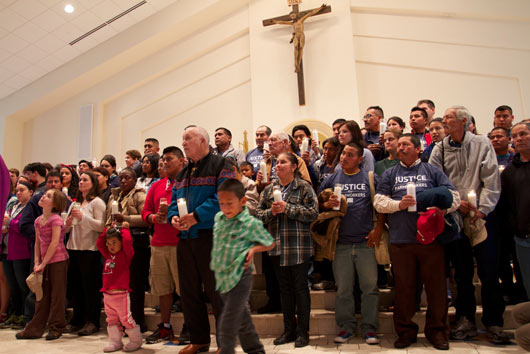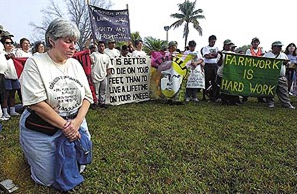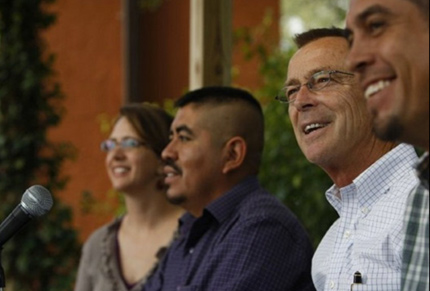CIW's Gerardo Reyes on Why We Are Marching (words to the congregation of Jesus Obrero Church at the launch of the march, March 3, 2013)
At a mass celebrated at Ft. Myers' Jesus Obrero Catholic Church to celebrate the launch of the CIW's March for Rights, Respect, and Fair, the CIW's Gerardo Reyes addressed the congregation to explain whe we are marching:
"I'd like to speak for a moment about why we are marching. I am reminded today about a march we did thirteen years ago. At that time, we marched to call on the agricultural industry to sit with us at the table of dialogue, to talk about how we might, together, improve labor conditions in the fields, about how we might earn a wage sufficient to provide a dignified life for our families. But at that moment, the industry was not yet ready. Today, thirteen years later, we have won the changes we were seeking then in the hearts and minds of the many companies that are willing to work with us to improve all the abusive conditions that have existed for too long in the agricultural industry. With the support of many people -- who, as we have all these years, dared to dream that a better world is possible -- we have made many advances in our struggle. Students, people of many faiths, people from many different states, and from many different countries have joined with us in our efforts to make our dream of a dignified life a reality. Thanks to those efforts, there are eleven food corporations that have also joined with us, among them McDonald's, Burger King, Subway, and many more. Today, we are marching with the support of those eleven corporations. And many of the tomato growers also are committed to supporting the changes we have won and working with us. They have joined forces with us and with our allies from over these many years to call on Publix -- the supermarket that uses its power to demand the lowest possible price for their tomatoes in the market without concern for conditions that we as workers must suffer so that those tomatoes make their way from the fields to their stores. Far too often, we must trade our dignity for work, for fear of complaining, because if we complain we can lose our job and with it our ability to provide for our families. We are going to march 200 miles, from this point to the city of Lakeland, where Publix's corporate headquarters is located. And we invite all of you to join us on this march, if possible, but if not, we ask for your prayers of support, in support of the workers in Immokalee. And for those who can, we invite to you join us in Lakeland on the weekend of the 16th and 17th. There we will have arrived after marching 200 miles to remind the wealthy owners of the Publix corporation that, though we are indeed poor, we too are human beings and we deserve respect and dignity. Thank you." |
CIW, allies to march 200 miles to Lakeland in March for Rights, Respect and Fair Food!
 2/20/2000: The two-week, 230-mile "March for Dignity, Dialogue, and a Fair Wage" (right) begins in Ft. Myers...
2/20/2000: The two-week, 230-mile "March for Dignity, Dialogue, and a Fair Wage" (right) begins in Ft. Myers...
... 3/3/2013: Join us as we take to the streets again for the two-week "March for Rights, Respect and Fair Food" from Ft. Myers to Lakeland, Florida!
The Fair Food movement began nearly thirteen years ago, in February of 2000, when farmworkers from Immokalee -- who until then had been largely locked in anonymous battle with Florida tomato growers within the boundaries of Immokalee -- joined forces with students, people of faith, and everyday consumers to take their call for "Dignity, Dialogue, and a Fair Wage" on the road. With little more than a map to guide them, a field truck to carry their supplies, and a 12-ft tall replica of the Statue of Liberty made of fabric, plaster and duct tape to lead the way, they took off on a two-week long trek from Ft. Myers to the offices of the Florida Fruit and Vegetable Association in Orlando.
 Among the marchers' number were several workers whose testimony led to convictions in two seminal slavery prosecutions (US vs. Flores, US vs. Cuello); an 18-yr old Romeo Ramirez, 23-yr old Lucas Benitez, and 22-yr old Julia Gabriel who three years later would receive the Robert F. Kennedy Human Rights Award for their leadership in the struggle for farmworker rights; and the core of young student activists who came together in the wake of those two unforgettable weeks to form the Student/Farmworker Alliance, now a key ally in the Fair Food movement. The march marked the first major excursion of Immokalee farmworkers outside the confines of southwest Florida and onto the cognitive map of the nation as a creative, and courageous, new force for social change.
Among the marchers' number were several workers whose testimony led to convictions in two seminal slavery prosecutions (US vs. Flores, US vs. Cuello); an 18-yr old Romeo Ramirez, 23-yr old Lucas Benitez, and 22-yr old Julia Gabriel who three years later would receive the Robert F. Kennedy Human Rights Award for their leadership in the struggle for farmworker rights; and the core of young student activists who came together in the wake of those two unforgettable weeks to form the Student/Farmworker Alliance, now a key ally in the Fair Food movement. The march marked the first major excursion of Immokalee farmworkers outside the confines of southwest Florida and onto the cognitive map of the nation as a creative, and courageous, new force for social change.
Today, we would like to announce that the Fair Food movement is returning to its roots. This coming spring (March 3-17) we are taking to the streets again in a two-week march, from Ft. Myers to Publix headquarters in Lakeland, the "March for Rights, Respect and Fair Food."
The march will have two goals. First, we will march to mark the progress we have made since the turn of the new millennium, progress culminating in the historic changes underway today thanks to the Fair Food Program. And second, we will march to underscore the hard work that remains to be done as supermarket industry leaders -- chief among them Publix -- continue to undermine that progress and deny their responsibility to do their part to end decades of farmworker poverty and degradation.
Thirteen years is a long time in the life of a movement, and as we prepare in the coming months for two weeks on the road, we begin by taking a quick look back at what has transpired in this remarkable period.
The March:
The Naples Daily News article from the launch of the march on February 20th, 2000, began:
"At first glance, the tall statue on the back of the pickup looked like a small-scale replica of the Statue of Liberty. The pickup inched along U.S. 41 shortly after 9 a.m. Saturday for the start of the Coalition of Immokalee Workers' walk from Fort Myers to Orlando. The 230-mile march is aimed at calling attention to workers' efforts to get higher wages and scheduled to end on March 4.
The statue, which workers say also represents liberty, was a bit different than the one of New York fame. In the statue's left arm was a bucket of tomatoes; her right hand extended outward, offering up a single tomato. On the pedestal, a simple message: "I, too, am America!" The words echoed the concerns of about 200 people who gathered for a short rally in Fort Myers before the march began.
|
The march ended two weeks later at the locked doors of the Florida Fruit and Vegetable Association, to which Julia Gabriel affixed the Ten Principles of Farm Labor Justice, founded on this fundamental principle: "By virtue of the hard and dangerous work we do we have earned the right to talk with our employers about wages and other working conditions."
Since the March:
Though they were turned away that day, the marchers' efforts were by no means in vain. Here are just a few of the highlights since those two hundred intrepid marchers crossed the Caloosahatchee River on their way north from Ft. Myers:
-
The statue has moved to Washington, DC, where it now resides as part of the permanent collection at the Smithsonian's National Museum of American History:
"'It's wonderful and it's evocative. It's a democratic movement for a political voice and it's great because it reminds us of some of the core values we think of as Americans and the freedom to participate,' said Barbara Clark Smith, museum curator of social history." read more |
-
The award-winning Student/Farmworker Alliance has gone on to become one of this country's most successful student movements for social justice.
"The spark that ignited SFA was the 230-mile March for Dignity, Dialogue and a Fair Wage from Ft. Myers to Orlando, Florida, led by the Coalition of Immokalee Workers in February 2000. This march provided the opportunity for students from several Florida colleges to learn about and directly participate in the movement to end 'sweatshops in the fields.'" |
-
And Florida tomato growers have moved from their original posture of unwavering resistance in the face of the pending march, captured in these quotes from industry leaders at the time:
"... Meanwhile, (Ray) Gilmer said the FFVA's Board of Directors has no way of knowing if the Coalition is a 'bona fide representative' to all of Immokalee's migrating farmworker population.... ... "We are struggling to try to make ends meet," [Reggie Brown, executive vice president of the Florida Tomato Exchange] said. "I personally would not want to ask for any more money at this point...the dollars are not there." read more |
to one of cooperation and partnership, sealed with an historic breakthrough a decade later, when the CIW and the Florida Tomato Growers Exchange came together in 2010 for a joint press conference to announce their landmark Fair Food agreement:
“This is a watershed moment in the history of Florida agriculture,” said Lucas Benitez of the CIW (above, second from the left, with Reggie Brown of the FTGE at his side). “With this agreement, the Florida tomato industry – workers and growers alike – is coming together in partnership to turn the page on the conflict and stagnation of the past and instead forge a new and stronger industry.” read more
Even more important than that phenomenal victory, however, has been the development of the worker-driven Fair Food Program that it made possible. Under the Fair Food Program, participating growers have:
|
The Fair Food Program has created a new world within the Florida tomato industry, one in which workers have new rights on the job, are able to learn about those rights while at work, and are free to complain, without fear of retaliation, when those rights are violated, knowing that those complaints will be effectively investigated. (Below, workers learn about their rights under the Fair Food  Program at an Immokalee area farm during a worker-to-worker education session last month.)
Program at an Immokalee area farm during a worker-to-worker education session last month.)
And this new world is built upon the Fair Food agreements established over the nearly 13-year history of the Campaign for Fair Food, under which buyers agree both to help increase workers' pay, through the penny-per-pound price premium, and to purchase Florida tomatoes only from those growers who are in compliance with the Fair Food Code of Conduct. This second condition supports the changes underway today in the Fair Food Program in two essential ways: 1) It provides growers a market incentive to join the Program and leave behind the world in which workers' rights are routinely violated without recourse, and 2) It creates market consequences when workers' rights are violated within the Program, which both makes those rights real in the event of a violation and encourages the prevention of abuse before it happens.
This new world stands in stark contrast to the old way of doing business, where tomatoes were grown, sold and purchased with "no questions asked," where crewleaders ruled the fields with an iron fist for decades, and where growers turned a blind eye to repeated headlines exposing sexual harassment, wage theft, and slavery, as long as sales remained unaffected.
Today:
But while much has changed -- prompting "Tomatoland" author and longtime Florida tomato industry observer Barry Estabrook to describe Florida tomato growers today as "on the road to becoming the most progressive group" in the US produce industry -- one thing has remained the same. Despite the growing acceptance of the Fair Food Program among the nation's retail food giants -- with eleven multi-billion dollar food corporations now on board -- the supermarket industry, including Florida-based Publix, has stubbornly refused to recognize the changes sweeping through Florida's fields, and refused to contribute its fair share to those changes.
In fact, it was almost two years ago to the day when Publix spokesperson Dwaine Stevens told the Baldwin County News:
“We don’t have any plans to sit down with the CIW,” Publix’s Media and Community Relations Manager Dwaine Stevens said, also citing that the company sells around 36,000 products in the stores and it cannot get involved with each product’s labor issues. “If there are some atrocities going on, it’s not our business." (emphasis added) read more |
In the two years since that statement, Publix has only grown more entrenched in its unconscionable resistance to joining the most promising program for farm labor justice in a generation. The company's 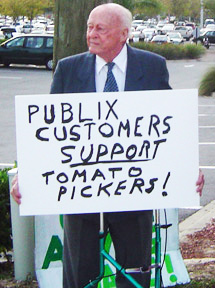 justifications for refusing to do its part are as varied as they are disingenuous. Here are just a few:
justifications for refusing to do its part are as varied as they are disingenuous. Here are just a few:
-
"As a community partner for more than 80 years, it would be unconscionable to believe that our company would support a violation of human rights. We are unaware of a single instance of slavery existing in our supply chain."
-
"This is a labor dispute and we have a practice of not intervening in labor disputes."
-
"We suggest... [the Fair Food Program] put the cost of the tomatoes in the price they charge the industry for the goods... Publix is more than willing to pay a penny more per pound or whatever the market price for tomatoes will be in order to provide the goods to our customers."
All of these public relations responses to a human rights crisis represent a daily betrayal not only of the most basic tenets of modern corporate social responsibility, but of the eloquent words of Publix's own founder, Mr. George Jenkins, who once famously described his guiding business philosophy in this simple, honorable, phrase: "Don't let making a profit stand in the way of doing the right thing."
In its decision to reject the opportunity to join the more modern, more humane world of ethical supply chain management represented by the Fair Food Program, today's executives at Publix have besmirched their founder's vision of social responsibility and shamed the company he helped build into the $27 billion giant it is today.
******************************
And so we will, once again, march. We will march to celebrate the changes underway today in Florida's tomato industry. We will march so that Publix does, finally, support the Fair Food Program. We will march so that those growers who refuse to meet the new standards no longer get solace, and sales, from retailers 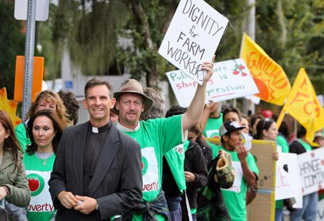 like Publix who remain willing to purchase tomatoes produced the old way, “no questions asked.” And we will march so that, one day, farmworkers across this country might enjoy the unprecedented new rights and working relationships being born today in the fields of Florida.
like Publix who remain willing to purchase tomatoes produced the old way, “no questions asked.” And we will march so that, one day, farmworkers across this country might enjoy the unprecedented new rights and working relationships being born today in the fields of Florida.
Join us, and help us win the participation of Florida's wealthiest corporation in a program that is changing the lives of Florida's poorest workers, workers who harvest the food for Publix's shelves and still bear unimaginable poverty for its profit.
It is time for Publix to “do the right thing.” Until they do, it is time for us, all of us, to march. Stay tuned in the months to come for how you can be a part of the March for Rights, Respect and Fair Food!






